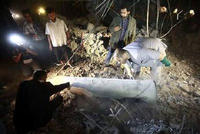-
U.S. commandos kill Osama bin Laden
In a brilliant commando operation deep inside Pakistan, a Navy Seal team killed Osama bin Laden then took his body to an American military base in Afghanistan for DNA verification of his identity; the DNA matched; the operation got underway last August when information was gathered showing bin Laden hiding in a compound in a small Pakistani town 150 km north of Islamabad, Pakistan’s capital; President Obama gave the go-ahead to the operation on Friday, 29 April; in addition to Bin Laden, three other men were killed in the operation, including one of Bin Laden’s sons — and a woman who was used by the men as human shield
-
-
Coalition escalates pressure on Gaddafi

The continuing ineffectiveness of the anti-Gaddafi rebels, and the flexibility and adaptability that the pro-Gaddafi forces have shown, have led the coalition to ratchet up the military pressure on Gaddafi: Britain, France, and Italy have decided to inject military advisers into rebel-held eastern Libya, and the United States began continuous patrols of armed drones over Libya; the latest, and probably most important, step was the decision to launch air strikes targeting command, control, communications, and intelligence (C3I) hubs and facilities; in one such attack over the weekend, one of Gaddafi’s sons — who was at the compound at the time — was killed, along with his three children; some have speculated that the coalition is now targeting Gaddafi and his family, but analysts say that legal questions aside, such targeting will have no effect on the military realities on the ground while making it politically and diplomatically more complicated to carry on the campaign
-
-
U.K. universities accused of being "hotbeds of Islamic extremism"

British universities have been accused of being fertile breeding grounds for violent extremism; a recent investigation by British MPs claims that Islamic fundamentalism has flourished at universities and school officials have done little to stop it; school officials have denied these charges and insist that the report is entirely lacking in factual evidence; university vice-chancellors said the parliamentary report conflates the fact that young people are susceptible to radicalization and that a very large percentage of young people in the United Kingdom attend universities
-
-
247 on U.S. terror watch list bought guns, explosives in 2010

There are eleven reasons why an individual may not be able to buy firearms or explosives in the United States — for example, being a convicted felon or an illegal immigrant; those on the U.S. terror watch list, however, are free to buy firearms and explosives; according to the FBI, in 2010 247 of them did — a similar number to that of 2009; some lawmakers want the attorney general to be able to prevent an individual on the watch list to buy a gun, but the counterargument is that the list is not always accurate, and that the attorney general is a political appointee; moreover, the list is secret, and letting people know they are on it may complicate the ability of law enforcement to track them and their associates
-
-
Strikeout! Yankees release ticket holders' personal data
Apple and Google, Sony and Microsoft have all made news with security failures in the last weeks; the venerable New York Yankees baseball franchise now joins that list with the release of personal information of half of their season-ticket holders; this is but the latest example of cyber vulnerability owing to human fallibility
-
-
Palestinian missteps; Assad may need a mid-course correction
Over the past four years, since Salam Fayyad became prime minister of the Palestinian Authority on 15 June 2007, the Palestinians have made steady progress toward realizing their dream of self-determination; Fayyad openly said that his plan was to emulate the way the Zionist movement, from the turn of the last century until the declaration of Israel’s independence in 1948, worked diligently to build the economic, social, political, and educational infrastructure of the state so that when the state did come it would have solid foundations; he has been successful, adding to his success the fact that the level of mutual confidence and cooperation between the Palestinian and Israeli security services has never been higher; in September, the UN will recognize Palestine as a state and accept it to membership; all these achievements may be derailed by the dramatic announcement on Wednesday of a Fatah-Hamas reconciliation; further north, in Syria, the Assad regime is using ever-increasing violence to suppress the anti-government protests; the question is what will happen first: the end of the protests, or the refusal by the military to continue to kill 100-200 unarmed civilians a week
-
-
California school building regulators had ties with anti-regulation lobby group
A California watchdog group recently revealed that state officials in charge of enforcing earthquake standards for school buildings have had a long and questionable relationship with a lobbying group that actively works to oppose building safety regulations in public schools; senior officials with the Division of the State Architect had been dues paying members of the Coalition for Adequate School Housing, which actively lobbies for less regulation on school construction; in 1997, state regulators were told that taxpayers would reimburse their membership dues to be a part of the lobbying group; officials maintain that there has been no corruption; in 2010 a major regulatory provision in place since 1933 was removed
-
-
U.S. reducing number of data centers, moving to the cloud

The U.S. government operates 2,100 data centers; these centers, together, occupy more than 350,000 square feet; to cut cost and increase security, the government plans to close 137 of the centers by the end of the year, part of a broader plan to close 800 data center within the next five years; in addition, 100 e-mail systems serving about one million government employees will be moved to the cloud
-
-
Sony's gaming network hacked, Microsoft's follows suit

Gamers are in a frenzy over Sony’s announcement that its PlayStation network security had been breached, resulting in the exposure of a large amount of each user’s personal and financial information; the first of an expected flood of lawsuits, as well as class action is filed in U.S. District Court; Microsoft announces an exploited vulnerability in one of their game titles leading to phishing attempts, and acknowledged that previously banned “modded” consoles were attaching to the network again
-
-
Syria is set to join the UN Human Rights Council

The Syrian regime has intensified its campaign against anti-government protesters; some 400 protesters have been killed so far and many hundreds have been wounded by live rounds the Syrian police and military use against the protesters; dozens of people suspected of harboring anti-regime sentiments have disappeared — apparently abducted by secret service agents and sent to remote prison camps; the military has surrounded several cities in a move reminiscent of Bashar al-Assad’s father, Hafez, who, in February 1982, ordered the destruction of the city of Hama in a scorched-earth policy against the Muslim Brotherhood; the grim news from Syria notwithstanding, the UN is scheduled to vote on 20 May on Syria’s membership in the UN Human Rights Council; the United States will vote against Syria’s membership, but the majority of the members of the UN will support it
-
-
Biometric meetings to tackle security issues
A meeting in Washington, D.C. on 5-6 May, organized by the Centre for Policy on Emerging Technologies , this event is part of the RISE project (Rising pan-European and International Awareness on Biometrics and Security Ethics), a task 2 initiative sponsored by the Directorate European Research Area of the European Commission that aims to contribute to the creation of a common strategic vision on responsible biometric innovation among the main international players, will address the issue of biometric security in a global perspective
-
-
Wyoming braces for spring floods
The Wyoming Office of Homeland Security is readying local and state agencies for projected spring floods and is urging local residents to prepare themselves as well; this year large snow packs from heavy winter storms have increased the likelihood of flooding; state officials are encouraging families to keep a three-day emergency kit loaded with food, water, clothing, flashlights, medicine, and important documents; last year floods hit Wyoming causing major disruptions, particularly in Fremont County; this year state officials hope to minimize the impact of floods with early preparation
-
-
Google joins Apple in privacy furor
iPhones transmit locations back to Apple, and Apple is not alone in this activity; Google has disclosed that its Android cell phones have been transmitting location data for some time; members of the Congress and Senate have begun to demand answers and explanations
-
-
The (re-)emergence of the Main Battle Tank

Many eulogized the Main Battle Tank as a relic of the past; armies no longer fight other countries’ armies, but rather non-state actors — often in urban setting; moreover, these sub-national organizations are equipped with sophisticated anti-tank weaponry which makes the employment of heavy armor costly (as Israel learnt in its war with Hezbollah in the summer of 2006); this is changing, though, as armies retrofit their tanks to make them relevant for asymmetrical warfare
-
-
Anti high-seas piracy coalition launches public campaign
“2,000 Somali pirates are hijacking the world’s economy” — this is the motto of a new coalition of maritime transportation organization which has launched a public campaign to encourage governments to take more active measures to tackle high-seas piracy; the Save Our Seafarers campaign has a Web site and will take out ads in leading world newspapers
-
More headlines
The long view
Factories First: Winning the Drone War Before It Starts
Wars are won by factories before they are won on the battlefield,Martin C. Feldmann writes, noting that the United States lacks the manufacturing depth for the coming drone age. Rectifying this situation “will take far more than procurement tweaks,” Feldmann writes. “It demands a national-level, wartime-scale industrial mobilization.”
No Nation Is an Island: The Dangers of Modern U.S. Isolationism
The resurgence of isolationist sentiment in American politics is understandable but misguided. While the desire to refocus on domestic renewal is justified, retreating from the world will not bring the security, prosperity, or sovereignty that its proponents promise. On the contrary, it invites instability, diminishes U.S. influence, and erodes the democratic order the U.S. helped forge.
Fragmented by Design: USAID’s Dismantling and the Future of American Foreign Aid
The Trump administration launched an aggressive restructuring of U.S. foreign aid, effectively dismantling the United States Agency for International Development (USAID). The humanitarian and geopolitical fallout of the demise of USAID includes shuttered clinics, destroyed food aid, and China’s growing influence in the global south. This new era of American soft power will determine how, and whether, the U.S. continues to lead in global development.
Water Wars: A Historic Agreement Between Mexico and US Is Ramping Up Border Tension
As climate change drives rising temperatures and changes in rainfall, Mexico and the US are in the middle of a conflict over water, putting an additional strain on their relationship. Partly due to constant droughts, Mexico has struggled to maintain its water deliveries for much of the last 25 years, deliveries to which it is obligated by a 1944 water-sharing agreement between the two countries.
How Disastrous Was the Trump-Putin Meeting?
In Alaska, Trump got played by Putin. Therefore, Steven Pifer writes, the European leaders and Zelensky have to “diplomatically offer suggestions to walk Trump back from a position that he does not appear to understand would be bad for Ukraine, bad for Europe, and bad for American interests. And they have to do so without setting off an explosion that could disrupt U.S.-Ukrainian and U.S.-European relations—all to the delight of Putin and the Kremlin.”
How Male Grievance Fuels Radicalization and Extremist Violence
Social extremism is evolving in reach and form. While traditional racial supremacy ideologies remain, contemporary movements are now often fueled by something more personal and emotionally resonant: male grievance.
